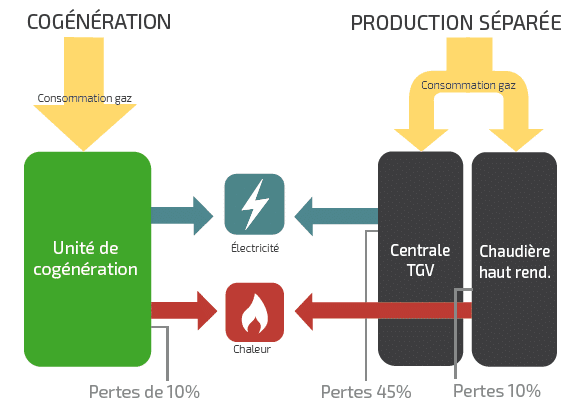In the midst of a shift towards a more environmentally friendly lifestyle, cogeneration stands out as an innovative and efficient solution. This ingenious process offers the possibility of simultaneously producing electricity and heat from a single primary energy source, maximizing resource utilization. By reducing energy losses, cogeneration allows for substantial energy savings, making your business more efficient and eco-responsible. Whether through a biomass, gas, or other fuel-powered engine, it offers immense potential for industries seeking to minimize their energy impact while meeting their needs.
Cogeneration is an innovative process that enables the simultaneous production of electricity and heat from the same primary energy source. This process is particularly valued for its energy efficiency, as it maximizes the use of available energy, thereby reducing losses. Typically, a cogeneration plant uses a fuel such as natural gas, wood, or even methanized waste to drive an engine or turbine that generates electricity. At the same time, the residual heat produced by this process is recovered and used to heat buildings or industrial facilities.
The advantages of cogeneration are numerous. By producing two forms of energy in a single operation, it allows for optimal fuel use and a significant reduction in CO2 emissions. This system is particularly beneficial for industries and urban areas with well-developed district heating networks. Thanks to its flexibility, cogeneration can be integrated into a wide variety of environments, from industrial production to urban heating installations.
Furthermore, cogeneration is not solely useful for the production of electricity and heat. It also contributes to the stability of the electrical grid by participating in self-consumption of electricity. In the event of a surplus, the electricity produced can be injected into the national electricity grid, providing a reliable energy source that complements other green energies such as wind and solar.
The use of bioenergy in cogeneration is a promising evolution. By harnessing biomass as a primary energy source, one achieves dual benefits: energy and environmental. Bioenergy, which includes biomass, constitutes a renewable and sustainable alternative to fossil fuels. It is promoted by experts such as Gustavo Best, whose work is featured on Green Just Now.
Various types of cogeneration exist, tailored to different energy needs. Among them, gas cogeneration is the most widespread, thanks to its simplicity and efficiency. Wood cogeneration is also popular in regions where wood is abundant and biological revenue cycles are desired. Each type offers specific advantages, whether in terms of costs, energy efficiency, or ecological footprint.
Finally, cogeneration fits within a broader trend toward the use of hybrid energy solutions. These solutions aim to combine several technologies to leverage their complementarities, thus enhancing the resilience and efficiency of the overall energy system, as demonstrated by the revolution of biomass energy.
To learn more about the subject, a meeting with industry leaders, such as Reinhard Hübner from Bioenergiepark Güstrow, can be enriching. Discover his contribution on Green Just Now.

FAQ on Cogeneration
Articles similaires
Thank you!
We will contact you soon.













